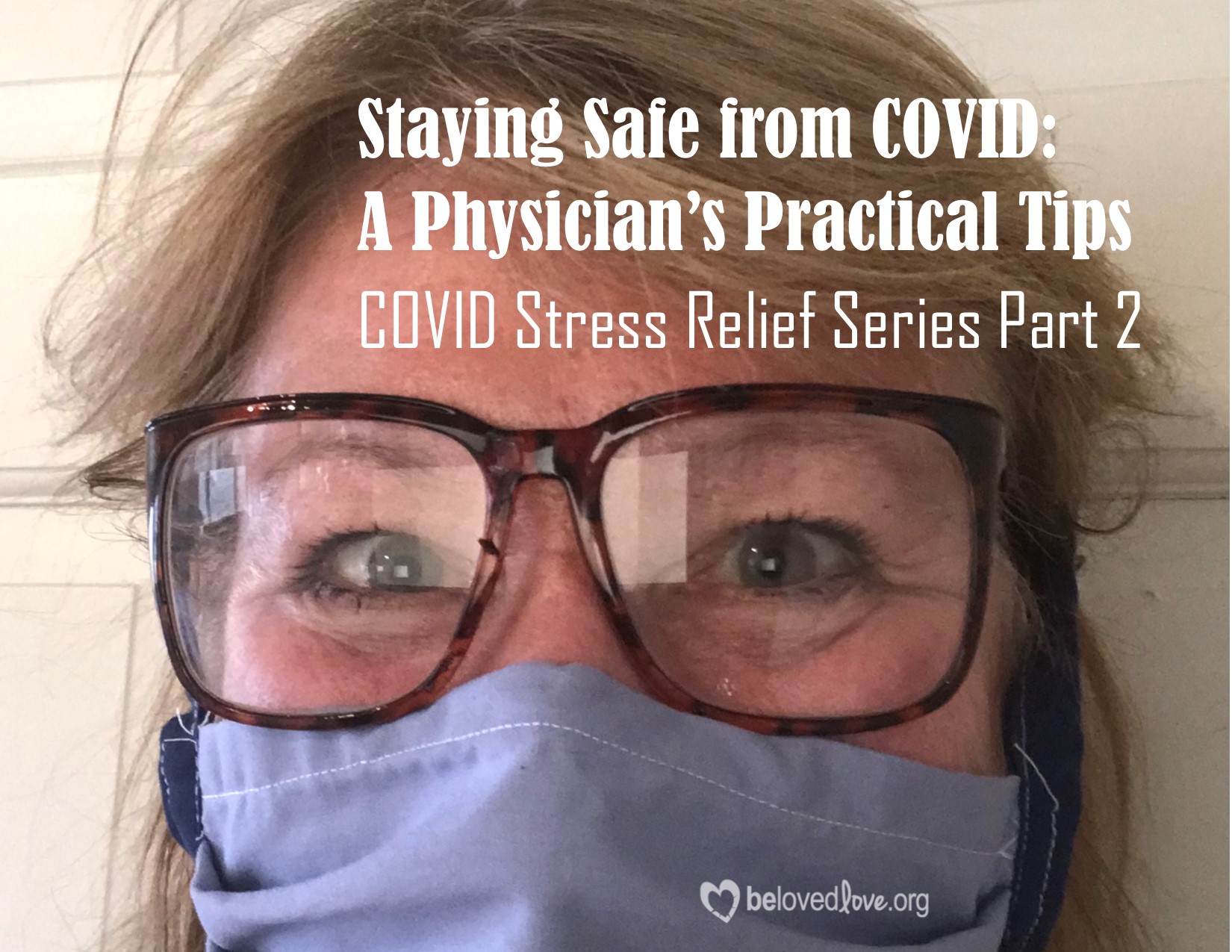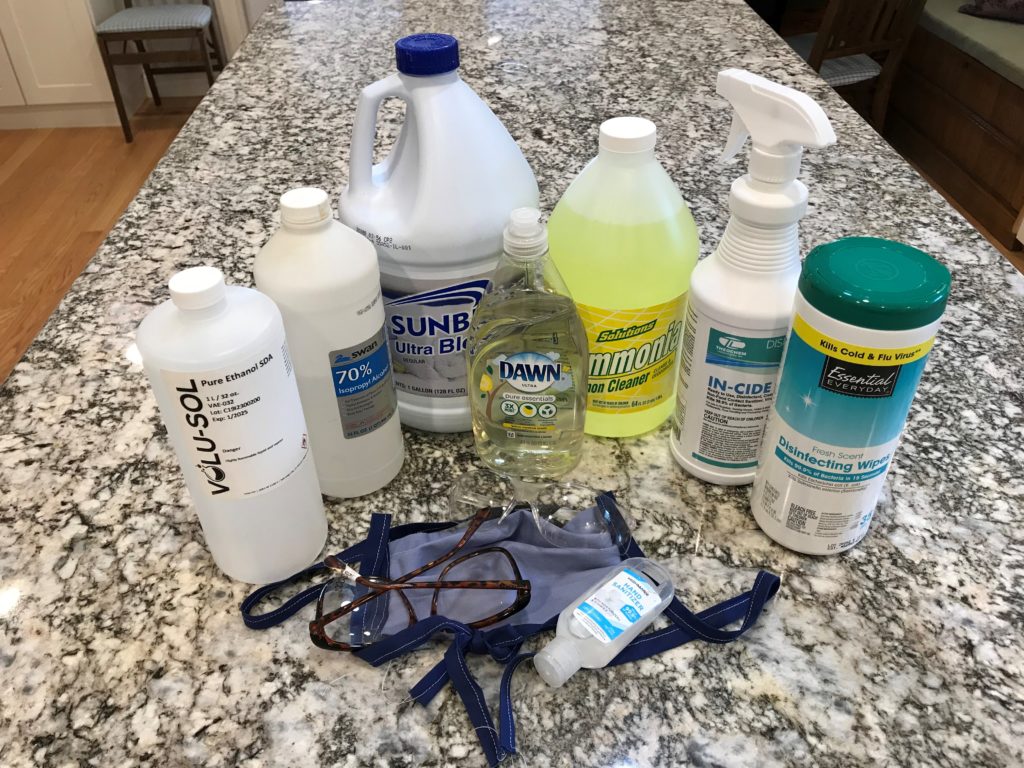
What are the best practical tips for minimizing exposure and spread of the COVID-19 virus?
There is a flood of information out there about what you should and shouldn’t do to stay safe and keep from infecting others. Just reading it all is stressful. How do you sift through it and come up with a reasonable plan for the next several months? A lot of people have been asking me about this, so I thought I would share with you what I am doing personally to stay safe. (Just remember, I am not speaking for any organization. I am simply sharing with you what makes sense to me based on the vast amount of articles I have been reading, combined with my training as a physician.)
Practical tips for staying safe
10 tips for staying safe at home:
- Cleaning products: there is a very extensive and confusing list on the EPA website about what products are effective against the COVID-19 virus. (Click here for complete list.) While COVID it is relatively easy to kill, please be aware that some common cleaning products such as vinegar and baking soda DO NOT kill COVID-19. Read your labels, and if in doubt, check the product’s website or the EPA site. Things that work great:
-
- 60% isopropyl alcohol (or ethanol, 60% or at least 120 proof)
- Bleach solution (1/3 cup bleach per gallon, or 3 tsp per quart. Make sure bleach is not expired.)
- Ammonia
- Hydrogen peroxide
- Standard “disinfectant” products
- Hand sanitizer
- Soap and water (if you scrub for 20 seconds).
- Hand washing. For many of us, hand washing at home can pretty minimal. THAT HAS TO CHANGE if you want to rid your hands of any possible COVID-19 germs. You need to thoroughly wash with soap and water. There are lots of tutorials out there on hand washing. Here is a good one.
- Daily: Wipe down much used surfaces every day, with something that will kill the virus fairly quickly. (Weak bleach solution, disinfectant wipes or sprays.) Let the product stay on the surface and air dry. Don’t dry off. (Here is a list of what I wash down every day: doorknobs, light switches, lamp switches, toilet seats and handles, all cabinet handles in kitchen and bathroom, fridge, microwave, dishwasher, washer and dryer handles, remote control, cell phones, regular phones, computer.) I also frequently disinfect pens/pencils and eyeglasses (we have a ton of readers lying around).
- Weekly: Thoroughly clean the house every week. Vacuum frequently and keep dust to a minimum.
- Disinfect anything that comes in the house—anything. If you get a package, open it, wipe down the contents, throw away the outside package (or if you recycle, don’t touch it for at least 1-2 days if it is cardboard, longer if it is other material.) If you leave something in the garage you have not sanitized, write the date that it is safe to touch on it. And leave it alone until then.
- Clean air: Open the windows and get fresh air. COVID-19 is much more likely to be IN your home than outside, so when you mix outside air with inside air, your chances of getting airborne COVID go down. If you have an air filter, keep it on all the time. Replace your heating/air conditioning filter if it is old, and get a HEPA filter if possible.
- Minimize contact with children. And minimize your children’s contact with other children. Kids get COVID-19 with little or no symptoms, and because they are not very good at social distancing, they are much more likely to spread the virus to others incognito. No play dates at the park. In fact, I would not recommend going to a public playground, unless you plan to first wipe down every surface and forbid any other children to play on it.
- Wear outside shoes when you are outside, and inside shoes when you are inside. This will keep you from tracking something from a surface where you have been back into the home. (Wisconsinites are really good at this!)
- If you get food delivery, wear a mask when you answer the door (see below), or get the delivery person to leave it on the steps. When you bring the food inside, wipe down and sterilize the packaging. Including what the food is wrapped in. Alternatively, you could unwrap it without touching the food, and place it on a clean plate, and then wash your hands.
- If you wear contacts, consider changing to the daily wear type, and throw them away at the end of the day. (I’m switching over this week.)

10 tips for staying safe when you have to go out:
- Take hand sanitizer and use it when you get in the car and get out of the car. Wipe down your steering wheel, car handles, and dashboard regularly.
- Get some made-at-home masks. Don’t deplete the already limited supply of hospital grade masks out there. Save them for the frontline professionals, who are at highest risk. You can make masks yourself (website tutorial here). There are also lots of people around the country making masks. There is probably someone in your area who would sell or give you a homemade mask. If not, you could follow the instructions from one of the many tutorials, and just use hot glue instead of sewing. This works great, actually. Use fabric that is tightly woven, not knit. And at least 2 layers of fabric. I used some old pillowcases for mine. I personally like the strings better than the elastic, because the fit is tighter. If you don’t have binding to make the ties, strings or ribbons work well.
- Wear a mask + eye protection (glasses, goggles) if you are going to be around other people, like at a store, or even a drive through. This may seem like overkill to some of you, but here are the reasons why I do this:
- Other people aren’t wearing masks and eye protection. From what I have seen so far, cashiers and restaurant workers are not wearing face protection. Many times you will get close enough to these people for transmission to occur when you are checking out or being handed your takeout order. Same goes for delivery folks.
- Eyewear and masks will keep you from touching your mouth and eyes with potentially infected hands. Most people regularly touch their face (including either mouth, nose or eyes) several times per hour. And when you are at a place such as a grocery store, you will touch a lot of surfaces other people have touched. The eye and face protection can serve as a barrier to keep you from then transmitting potential infection to yourself.
- Masks also protect you to some degree from possible airborne source of infection. Homemade masks are not ideal for this, but they do help. The ones that are multilayered, and have a place for a filter, obviously will provide better protection than some other styles.
- Protecting others. If you sneeze or cough while out, it will reduce or keep particles from spreading to others. (Always act like you are infected, as well as other people, when you are out.)
- Grocery store bags: If you use fabric bags, put them immediately in the wash when you get home. So if you use plastic bags, put them in the trash or clean recycle bin immediately after emptying, and don’t touch them for at least 2 weeks. In one study from a cruise ship, COVID-19 was found on plastic 17 days after exposure.
- When you get home: Don’t forget to sanitize keys, credit cards, wallet, purse, or anything else you take in the house. (Think twice about how many things you need to carry with you – the less you bring out of the house, the less you will need to sanitize when you return.) Designate a “dirty” spot where you can dump keys, phone, sunglasses, etc. when you walk in the door. Take your mask off and put it in the wash. Clean your shoes or leave them at the door.
- Disinfect your groceries. Wipe down all surfaces that come in the house.
- Wash your produce. I soak all my produce in a dilute bleach solution. I let it sit in this solution for at least 5 minutes, and then rinse with tap water. It is quite important to rinse off all produce after soaking for 3-5 minutes in order to prevent potential toxicity. Why? Produce has been handled not only by grocery store staff, but by many people picking something up and putting it back down. In my opinion, it is an overlooked source of infection. And as noted above, I do not recommend using vinegar – it doesn’t kill COVID, and becomes highly toxic when mixed with bleach.
- If you work with the public, wear a mask/eye protection and wash your hands frequently.
- If you are a health care worker, you may consider extra precautions, such as removing and laundering all work clothes when you get home and immediately taking a shower.
- Wear a waterproof watch. I have a Fitbit that I keep on, and when I wash my hands, or get in the shower, that gets washed too. Along the same vein, minimize jewelry, especially rings and bracelets.
So given what I know about the COVID-19 virus— how it spreads, what kills it, and how to minimize exposure, these are the things that I practice at home to minimize infection from the community. (They represent my personal practices, and not any professional association that I am connected to.)
Let me know your thoughts. And feel free to add any great links or websites to your comments.
Stay safe out there.
Lydia Floren, MD
3-31-20
If you would like a downloadable pdf of Staying Safe From COVID: A Physician’s Practical Tips, please click here and sign up for my weekly email.
The views expressed on this blog are my own and do not reflect the views of my employer.
Click to read other posts in this series:
10 Verses for When You Feel Stressed or Anxious – COVID Stress Relief, Part 1
The Power of Kindness – COVID Stress Relief, Part 3
More Verses to Combat Anxiety and Stress – COVID Stress Relief, Part 4
Great Reminders to Help with Anxiety and Stress – COVID Stress Relief, Part 5
Hi Lydia, i tHink I need to up my game. I am just starting to follow these routines. I took a sick dog to the vet yesterday. They had a procedure to keep us out of the waiting room, bUt I was stIll glad to get home. My plastic bags are n the garage. I wondered about them . Thanks, Marilyn
Ps we are all ok here so far. Take care, CoUsin!